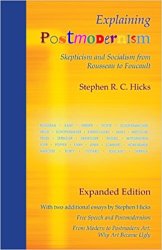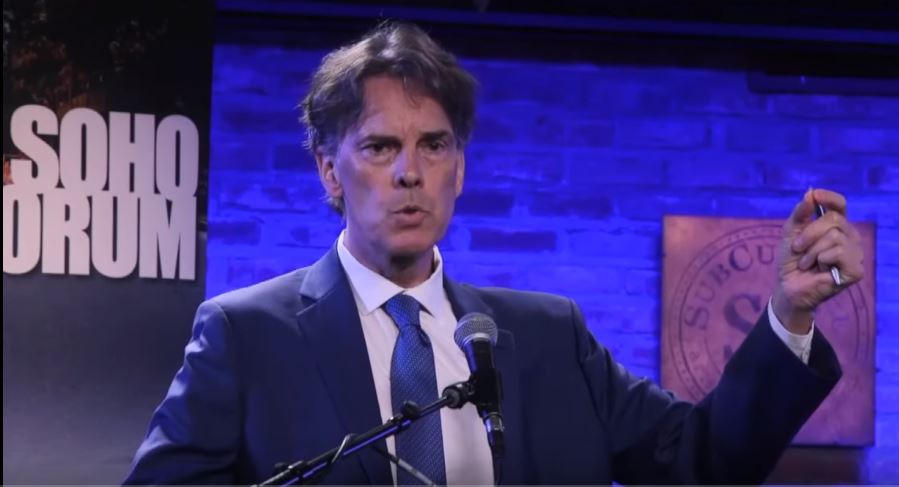During my SoHo Forum debate with Thaddeus Russell in New York, I offered to send sources for the quotations I used. My claims were that philosophy had fallen into an unusually skeptical place in the middle of the 20th century, and that the first-generation postmodernists absorbed and applied that skepticism.
Thanks to the debate audience members who prompted me to follow-up with the quotations.
Moritz Schlick, leading Logical Positivist, on the arbitrariness of language. From his “Meaning and Verification”:
* “the rules of language are, in principle, arbitrary”.
A. J. Ayer on the subjectivity of logic and math. From his Language, Truth, and Logic:
* “the principles of logic and mathematics are true universally simply because we never allow them to be anything else.”
W. V. O. Quine on no difference between the Homeric gods and the things contemporary scientists believe. From his “Two Dogmas of Empiricism”:
* “Physical objects are conceptually imported into the situation as convenient intermediaries — not by definition in terms of experience, but simply as irreducible posits comparable, epistemologically, to the gods of Homer. … in point of epistemological footing the physical objects and the gods differ only in degree and not in kind. Both sorts of entities enter our conception only as cultural posits.”
Thomas Kuhn on scientists as brainwashed, and on abandoning realism, truth, and progress. From his The Structure of Scientific Revolutions:
* “the member of a mature scientific community is, like the typical character in Orwell’s 1984, the victim of a history rewritten by the powers that be.”
* “the proponents of competing paradigms practice their trades in different worlds.”
* “We may, to be more precise, have to relinquish the notion, explicit or implicit, that changes of paradigm carry scientists and those who learn from them closer and closer to the truth.”
Paul Feyerabend on science as fairy tales and dogmatism and as inferior to witchcraft and other methods. From his “How to Defend Society against Science” and Against Method:
* “I want to defend society and its inhabitants from all ideologies, science included. All ideologies must be seen in perspective. One must not take them too seriously. One must read them like fairy-tales.”
* “The massive dogmatism I have described is not just a fact, it has also a most important function. Science would be impossible without it. ‘Primitive’ thinkers showed greater insight into the nature of knowledge than their ‘enlightened’ philosophical rivals. It is, therefore, necessary to re-examine our attitude towards myth, religion, magic, witchcraft …”
Frank Lentricchia on power and indoctrination in education. From his Criticism & Social Change:
* His postmodernism “seeks not to find the foundation and the conditions of truth but to exercise power for the purpose of social change.”
* One’s task as a professor is to help students “spot, confront, and work against the political horrors of one’s time.”
 More sourced quotations on the epistemological roots of postmodernism are in Chapters Two and Three of my Explaining Postmodernism: Skepticism from Rousseau to Foucault.
More sourced quotations on the epistemological roots of postmodernism are in Chapters Two and Three of my Explaining Postmodernism: Skepticism from Rousseau to Foucault.

Hi Dr. Hicks,
Thanks so much for all the work you do! I enjoyed your books on postmodernism and Nietzsche.
I’m wondering if you’ve come across the work of David Stove, specifically his book “Scientific Irrationalism: Origins of a Postmodern Cult”, in which he traces the thought of Popper (and thus his descendents, Lakatos, Kuhn, and Feyerabend) to Hume’s inductive skepticism, and then rigorously demonstrates why such skepticism is irrational. There are many more quotes from these thinkers in that book which show their epistemological relativism and general irrationality.
Anyway, thanks again for fighting the good fight!
Wish you all the best,
Matthew
Thank you, Matt. I’ve read some of David Stove, and have a good impression of him, but it has been awhile.
Hi Dr. Hicks,
I traveled from Maine to see the SoHo debate and was glad I did. You did a great job as expected and made some good jokes.
I am currently reading Karl Popper and you mentioned him but let him go. He makes good points I think on critical rationalism but what do you think of him? Maybe an Open College topic?
Thank you for all your good work.
I am happy to hear the trip was worth it for you, Mark. Thanks for letting me know.
About Popper: I read him a lot in grad school, and one of my professors and dissertation committee members, Noretta Koertge, was a Popperian and had studied with him at LSE.
I think of Popper as one of the good guys, and as about 85% right in his views. But on some fundamentals, especially in epistemology, he makes some errors, ones that get teased out in the next generation by his followers and critics.
You’re right that Popper’s work could make a good OC episode.
(I might have taken the text too much out of his context, hope you will still find some articulations to follow its meaning, and not coming out of the blue)
The Nature of knowledge
A human experience
Providing a unique reality
The nature of knowledge through the understanding of the world is to define a unique reality that is used as a reference point, allowing us to solve problems, settle our arguments, to pass on reliable knowledge to the next generations, and build a civilization. However, if knowledge is subordinate to what a group wants, then power struggles become the way to settle arguments and to understand the world. The nature of Knowledge is thus defined to be a slave of the power struggles with the task to create ‘A’ truth, an ideology belonging to each group. It is precisely the lack of a reference point for all groups that favor the power struggle, but that exactly what they want, not civilization.
Knowledge has no master
The Marxists and even more the post-modernists ask knowledge to be subordinate to their will, but this is only a vestigial of our primitive self. It’s our allegiance to knowledge that builds civilization. Knowledge can’t be subordinate and must be protected above all, above the will of people whatever their number, above any laws and rules. If reality as the ultimate arbiter ceases to exist then we raise ourselves so high that we become our own God, and our words are all the knowledge that is to know.
The knowledge atrophy
I have now the unenviable task to explain to you that Marxists and all collectivists do not understand the nature of knowledge, and if you are below 60 years old, you have been educated by them. They think they can build a civilization, but they do not grasp how knowledge has to be structured to become the tool that makes a civilization to happen, and society to work. This occurred to me when I was working on the difference between knowledge and skills. The focus on skills instead of knowledge started during the 1960s. What they ended with, is to put children in a situation of an activity for which you have to use knowledge, but they haven’t the knowledge. For example, if you want to learn mathematics you have to put yourself in the shoes of a mathematician, they say. The whole thing is just a play, an imitation game. All generations born after the 1960s have shallow knowledge. We have several generations with knowledge atrophy. They won’t be able to pass on the knowledge required to manage our civilization, they already don’t know how to enhance it nor to see the problem in front of them.
The knowledge atrophy is a dark place because the ability to be autonomous as an individual requires to have as much knowledge as possible while respecting the society in which one lives. The only option for dysfunctional knowledge-related individuals is a collective, and the collectivists are aware of that.
Regarding Kuhn’s work. I believe that Mr. Hick and I have a very different reading of “The structure of the scientific revolutions”. I believe the chapter 13 is the problem. Maybe I missed something. You tell me.
The structure of scientific revolutions by Thomas S. Kuhn
This is a post-modernist book. He hides his intentions, changes the definition of concepts, to put forward his story as the only viable one. His true motives appear in chapter XIII starting with “These last paragraphs point the directions in which I believe a more refined solution of the problem of progress in the science must be thought…” The main thesis of the book is that there is no such thing as progress when it comes to science. The author does not recognize truth as an end-goal of the science project, rather science follows an evolution pattern similar to the one described by the theory of evolution and therefore without end-goal (life has no end-goal, it just exists and evolves).
Since the notion of progress is related to an end goal, the author tries also to convince us that the quest for truth is not legitimate, for without an end goal there is not ‘A Truth’ to get. The reality is that because the author reject the idea that there is such a thing as truth, then progress doesn’t make much sense. He begs the question. We find again the concept of changes, which oppose the concept of the constant evolution of things, and they happen during a power conflict that will generate new paradigms, like a revolution will do. Kuhn cannot see that science progress is done by the accumulation of knowledge and/or to reduce the margin of error of the truths we already have gleaned (reread the chapter on ‘Essentialism’ following Karl Popper’s definition, the open society and its enemies).